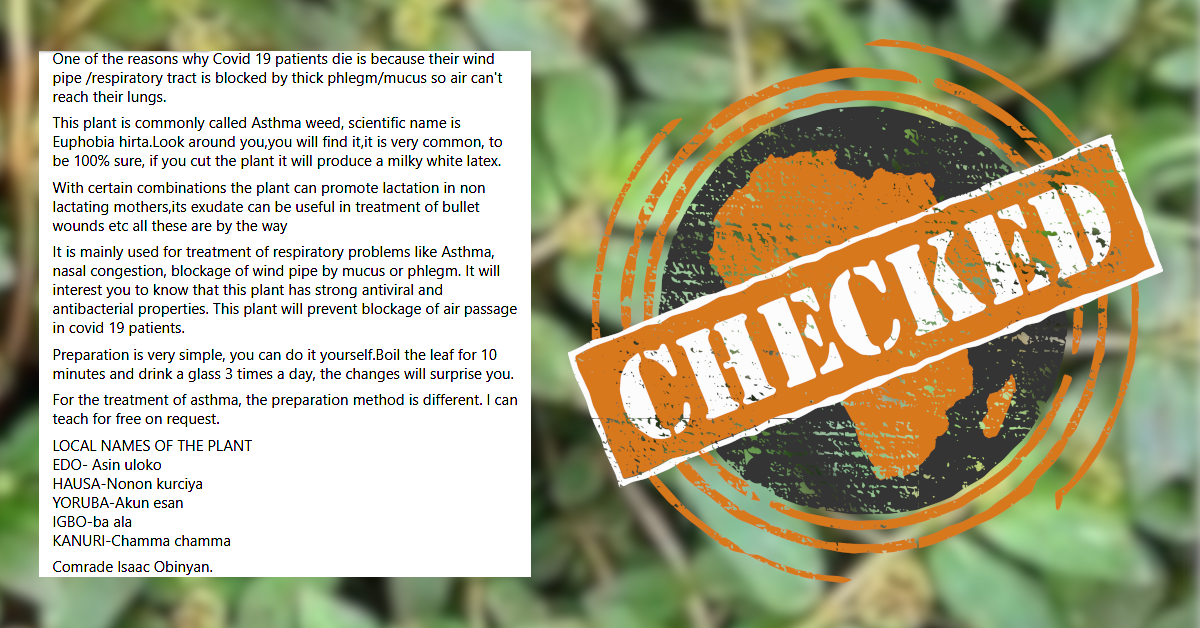A Facebook post claims drinking water in which leaves of the “asthma plant” have been boiled will prevent breathing complications in Covid-19 patients.
“One of the reasons why Covid 19 patients die is because their windpipe, respiratory tract is blocked by thick phlegm/mucus so air can't reach their lungs,” it reads.
It says asthma weed, scientific name Euphobia hirta, “will prevent blockage of air passage in Covid-19”. To prepare, “boil the leaf for 10 minutes and drink a glass 3 times a day, the changes will surprise you”.
The post has been shared more than 400 times. But is there any evidence that drinking an infusion of the asthma plant will relieve symptoms of Covid-19?

A few studies have explored the medicinal uses of the asthma plant, especially in treating bronchial and respiratory diseases such as asthma, bronchitis and hay fever.
A research group at Nigeria’s University of Ibadan says the asthma plant “may be a handy first-aid treatment as tea for people experiencing dry cough, respiratory failure, fever and diarrhoea which are some of the symptoms of Covid-19 infection”.
The group adds that “using the plant may thus help the patients to breathe with ease and remove the need for a ventilator for mild cases”.
But it also warns there is no evidence to prove this yet, and that the “powerful herb” must be used with care and only for a short period.
Prof Rasheed Awodoyin, weed ecologist and member of the research team, told Africa Check the plant has been used to treat cough, catarrh (mucus in the airway), flu and asthma.
Awodoyin said while its medicinal use is proven, a clinical test will have to be carried out “before we can authoritatively say it can prevent Covid-19-like symptoms”.
“We haven’t tested the plant on Covid-19 cases, we need money to carry out a proper clinical test before it can be applied to Covid-19 patients. The plant is safe and works well in treating cough.”
Africa Check found no evidence supporting the claim in the World Health Organization’s global literature on coronavirus disease.
“As efforts are under way to find treatment for Covid-19, caution must be taken against misinformation, especially on social media, about the effectiveness of certain remedies,” the WHO says.
“Many plants and substances are being proposed without the minimum requirements and evidence of quality, safety and efficacy. The use of products to treat Covid-19, which have not been robustly investigated can put people in danger, giving a false sense of security and distracting them from hand washing and physical distancing which are cardinal in Covid-19 prevention, and may also increase self-medication and the risk to patient safety.” – David Ajikobi
“One of the reasons why Covid 19 patients die is because their windpipe, respiratory tract is blocked by thick phlegm/mucus so air can't reach their lungs,” it reads.
It says asthma weed, scientific name Euphobia hirta, “will prevent blockage of air passage in Covid-19”. To prepare, “boil the leaf for 10 minutes and drink a glass 3 times a day, the changes will surprise you”.
The post has been shared more than 400 times. But is there any evidence that drinking an infusion of the asthma plant will relieve symptoms of Covid-19?

Nigerian researchers studying plant
A few studies have explored the medicinal uses of the asthma plant, especially in treating bronchial and respiratory diseases such as asthma, bronchitis and hay fever.
A research group at Nigeria’s University of Ibadan says the asthma plant “may be a handy first-aid treatment as tea for people experiencing dry cough, respiratory failure, fever and diarrhoea which are some of the symptoms of Covid-19 infection”.
The group adds that “using the plant may thus help the patients to breathe with ease and remove the need for a ventilator for mild cases”.
But it also warns there is no evidence to prove this yet, and that the “powerful herb” must be used with care and only for a short period.
Prof Rasheed Awodoyin, weed ecologist and member of the research team, told Africa Check the plant has been used to treat cough, catarrh (mucus in the airway), flu and asthma.
Awodoyin said while its medicinal use is proven, a clinical test will have to be carried out “before we can authoritatively say it can prevent Covid-19-like symptoms”.
“We haven’t tested the plant on Covid-19 cases, we need money to carry out a proper clinical test before it can be applied to Covid-19 patients. The plant is safe and works well in treating cough.”
WHO cautions about plant remedies
Africa Check found no evidence supporting the claim in the World Health Organization’s global literature on coronavirus disease.
“As efforts are under way to find treatment for Covid-19, caution must be taken against misinformation, especially on social media, about the effectiveness of certain remedies,” the WHO says.
“Many plants and substances are being proposed without the minimum requirements and evidence of quality, safety and efficacy. The use of products to treat Covid-19, which have not been robustly investigated can put people in danger, giving a false sense of security and distracting them from hand washing and physical distancing which are cardinal in Covid-19 prevention, and may also increase self-medication and the risk to patient safety.” – David Ajikobi
Republish our content for free
For publishers: what to do if your post is rated false
A fact-checker has rated your Facebook or Instagram post as “false”, “altered”, “partly false” or “missing context”. This could have serious consequences. What do you do?
Click on our guide for the steps you should follow.
Publishers guideAfrica Check teams up with Facebook
Africa Check is a partner in Meta's third-party fact-checking programme to help stop the spread of false information on social media.
The content we rate as “false” will be downgraded on Facebook and Instagram. This means fewer people will see it.
You can also help identify false information on Facebook. This guide explains how.





Add new comment